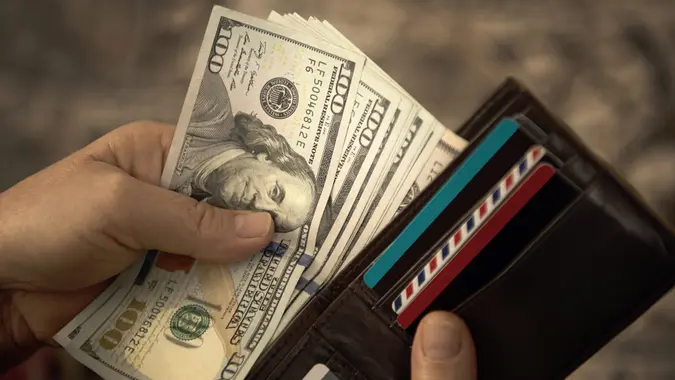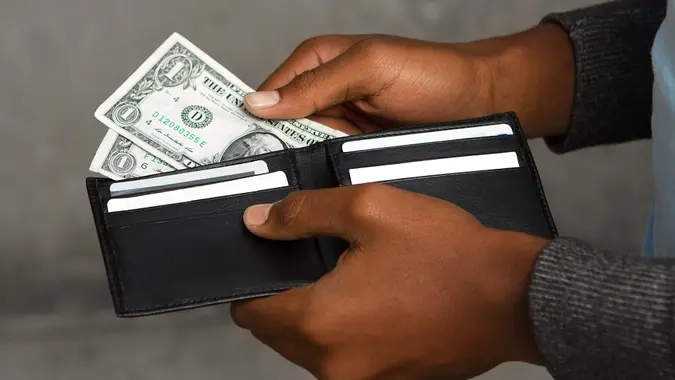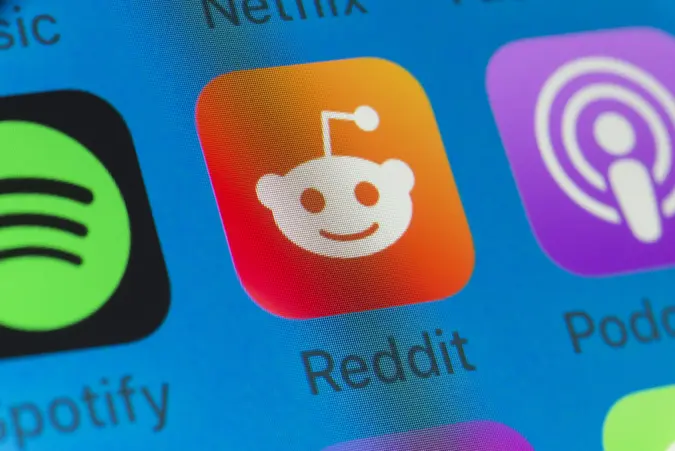5 Steps To Take If You Can’t Pay Your Bills

Commitment to Our Readers
GOBankingRates' editorial team is committed to bringing you unbiased reviews and information. We use data-driven methodologies to evaluate financial products and services - our reviews and ratings are not influenced by advertisers. You can read more about our editorial guidelines and our products and services review methodology.

20 Years
Helping You Live Richer

Reviewed
by Experts

Trusted by
Millions of Readers
Inflation and high interest rates have wreaked havoc on many household budgets. As many Americans can’t even adequately fill up an emergency fund, let alone consistently stick to a payment plan, more and more bills are piling up. If you don’t have a debt management plan and fear you won’t be able to pay your bills, there are steps you can take to help get your head above water.
What To Do If You Can’t Pay Your Bills
If you find yourself in a position where you are struggling to pay your bills this month, and the credit card companies are calling, the first step is to not panic. Even if you are behind, there are steps you can take to get your financial affairs in order. Here are some of the most important ones:
- Assess your budget
- Prioritize your needs
- Negotiate your bills
- Pay the minimums
- Pick up side work
1. Assess Your Budget
To avoid making the problem bigger than it may be, take a step back and look closely at your actual budget. See how much you’re earning this month and compare it to the bare minimum you will have to spend to pay your bills.
You may want to organize your bills by the due date, so you know when you’ll have to come up with extra money. Others prefer to organize their bills by size. Whichever method you prefer, it’s important to start by having all the information in front of you so you can take the next steps to resolve the problem.
A good budgeting system is the 50/30/20 rule of budgeting. It advises you to save 20% of your monthly income. That leaves 50% for needs, which can include essentials like mortgage payments, rent, utility bills, student loan payments, medical bills or groceries. The remaining 30% of your income is for discretionary spending.
2. Prioritize Your Needs
Everyone has a hierarchy of needs, and once you factor them into your budget, your monthly payments may start to make more sense and leave a little wiggle room in your bank account. Now that you know what you have and what you owe, it’s time to prioritize your outstanding bills.
Although all your bills are important, some can be paid later than others, or in lesser amounts, without triggering negative events. If, for example, you’re already 90 days late on your electric bill and your service is about to be shut off, this would qualify as an essential bill that you must prioritize. But if you’re still 30 days away from the payment on your cable TV service — which even if it got shut off wouldn’t be anything more than an inconvenience — that one can wait.
When covering your needs, remember to prioritize the following fundamental essentials — what financial expert Dave Ramsey calls the “four walls”:
- Food
- Shelter
- Utilities
- Transportation
3. Negotiate Your Bills
If you’re really struggling financially and simply won’t be able to pay a bill in full, it’s time to contact your lender or creditor. Oftentimes, you can receive a grace period to pay your bill during a tough time, particularly if you lost your job.
Other creditors may accept less-than-full payments to satisfy your account. However, others may take a harder line, and those may end up being bills you have to prioritize. But you won’t know until you call to negotiate with your creditors, so it’s certainly worth the effort.
4. Pay the Minimums
If the size of your outstanding bills is overwhelming you, focus instead on the minimum payments. For example, if you have $10,000 in credit card debt and can’t imagine a way you can ever pay it off, just make the minimum payments for now. While it’s true that it will take longer to pay off your credit card by just paying the minimum, at least you will keep from defaulting until you’re in a better position financially and can make larger payments.
The same is true with other accounts you may have. In some cases, you may even be able to pay a minimum amount on service accounts like utilities as well, but you’ll have to speak with your creditor directly to negotiate this.
Consider Taking Advantage of a 0% APR Credit Card Offer
This option requires a great amount of financial discipline, but in the right circumstances, it can be just the lifeline you need. Many credit cards offer promotional periods in which you can get a 0% APR on balance transfers and/or purchases for 12, 18 or even 20 months.
Over the short run, this can provide you with a break from your current cash flow problems and give you some breathing room to accumulate more money. But you absolutely must be in a position to pay that money back before the promotional period ends. Otherwise, you’ll end up in an even deeper hole or seeking out credit counseling agencies, as most credit cards charge interest in the high double digits, sometimes approaching 30%.
5. Pick Up Side Work
It can be hard to keep up with rising costs on a fixed income when they are jumping by nearly 10% per year. On at least a temporary basis, look into picking up a side hustle. Side gigs offer lots of advantages, including plentiful options, rapid pay and often the ability to work from home.
Even if you can bring in just a few hundred extra dollars per month, perhaps from tutoring, pet sitting or even selling items in your home, that may be enough to cover your bills until you can start earning more or until inflation gets back under control. There are many online options, or you can always check with social service agencies to see what’s available.
Final Take
Rather than dealing with a debt settlement company after the fact, sometimes it is easier to take small preventative measures when it comes to bill paying. If you weren’t lucky enough to get student loan forgiveness and your consumer financial situation is unstable, taking a few steps to build a budget and chip away at debts will not only serve you well month to month but also in the long run.
Caitlyn Moorhead contributed to the reporting for this article.
 Written by
Written by  Edited by
Edited by 

























